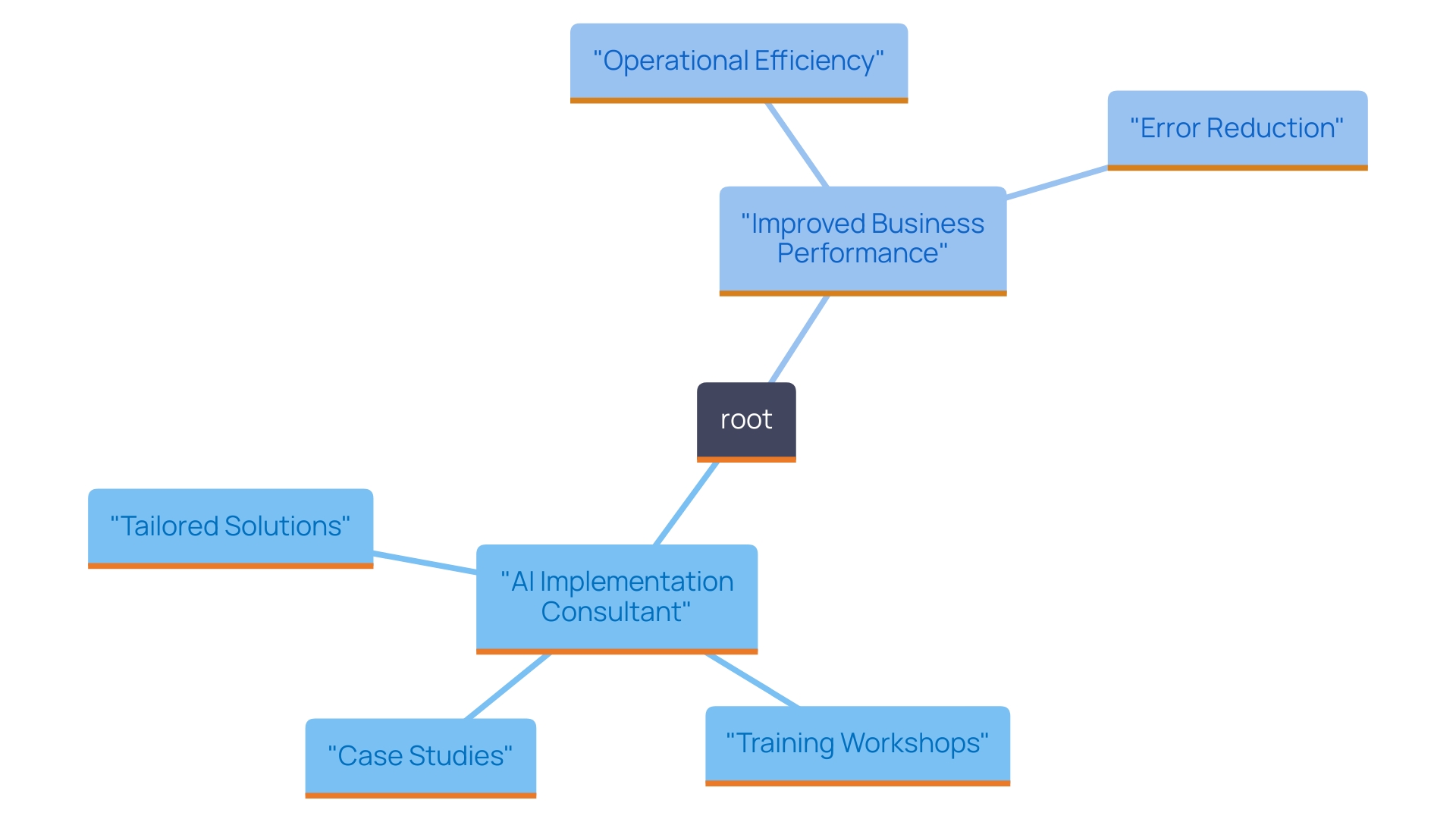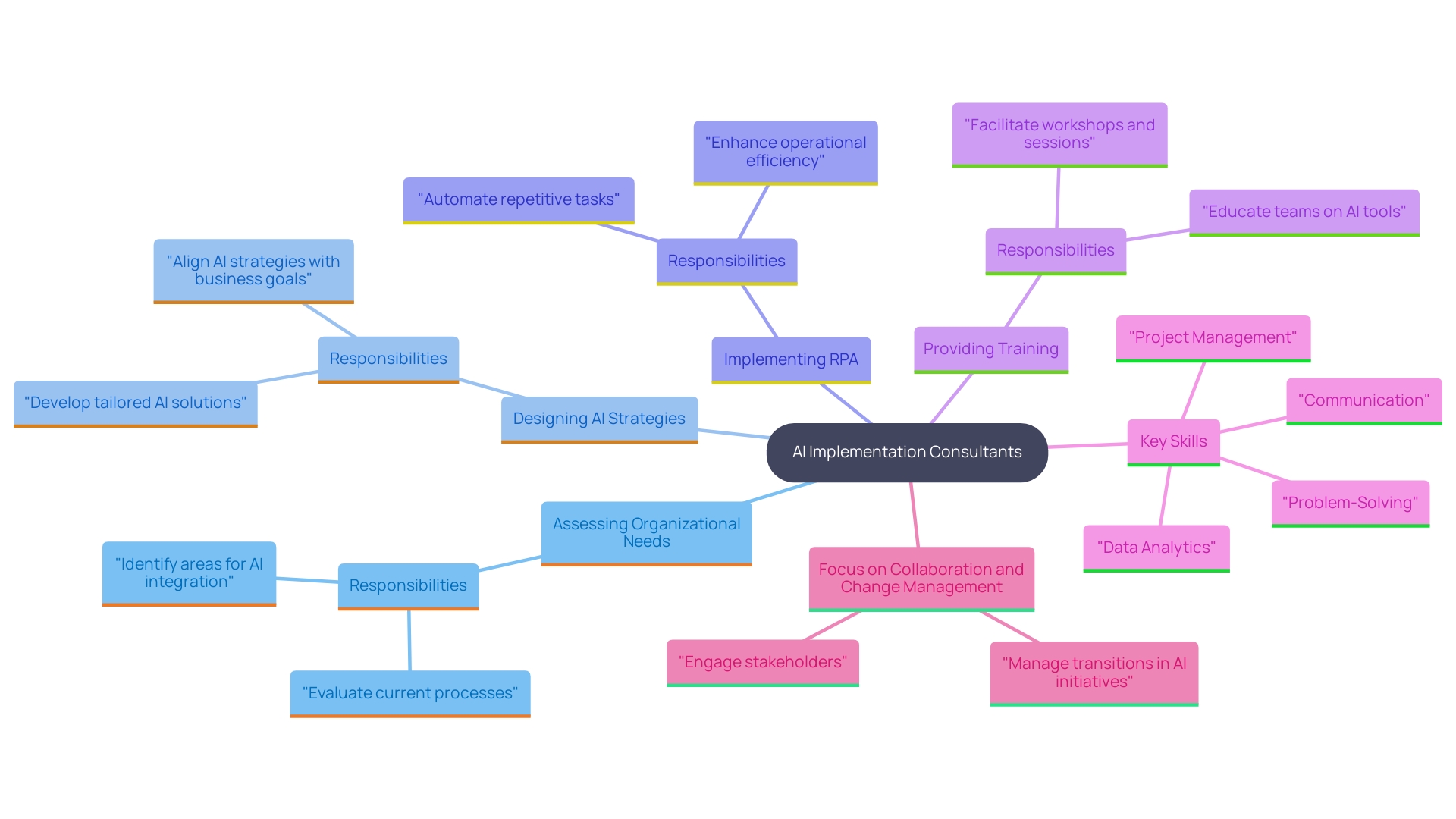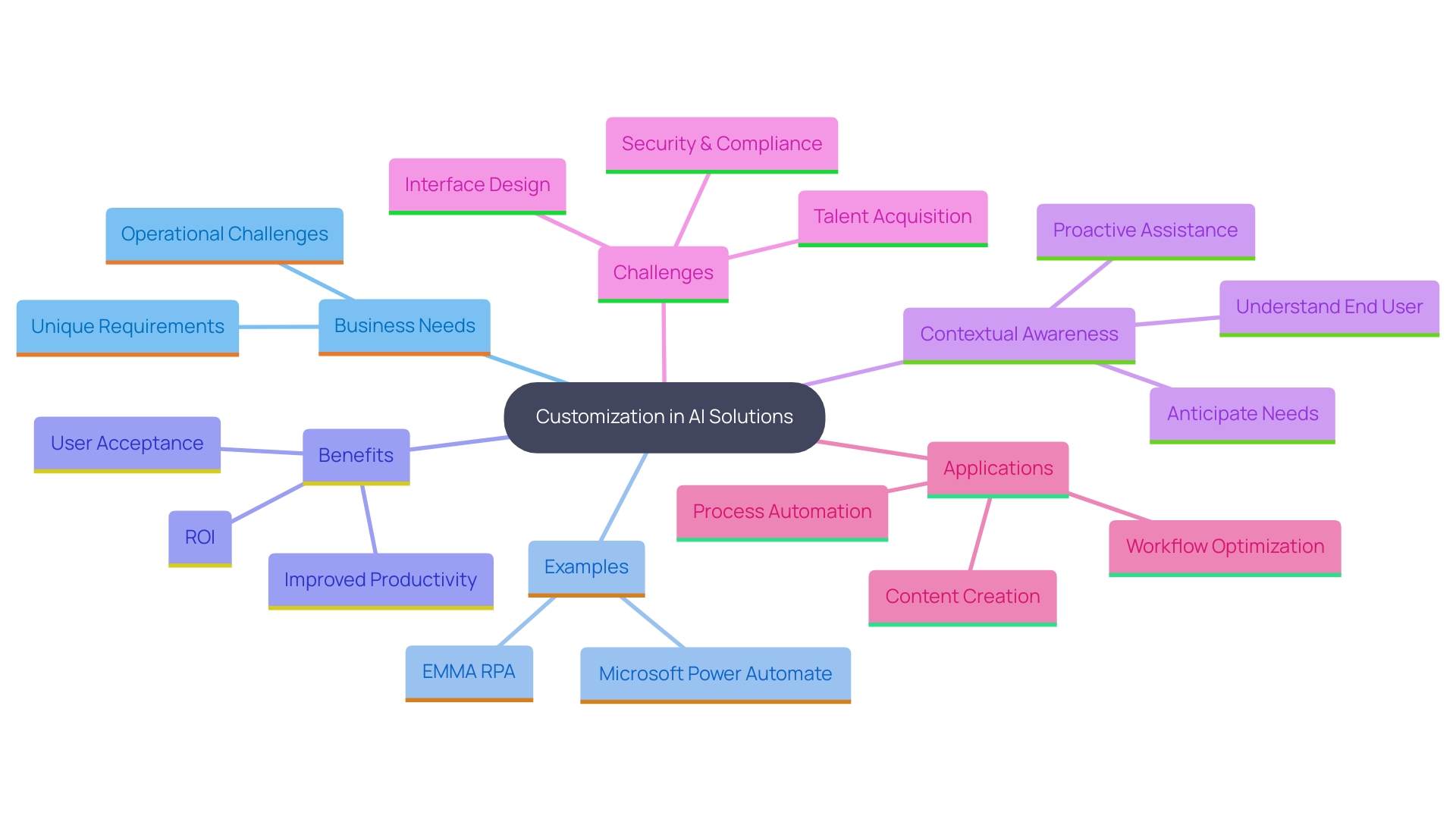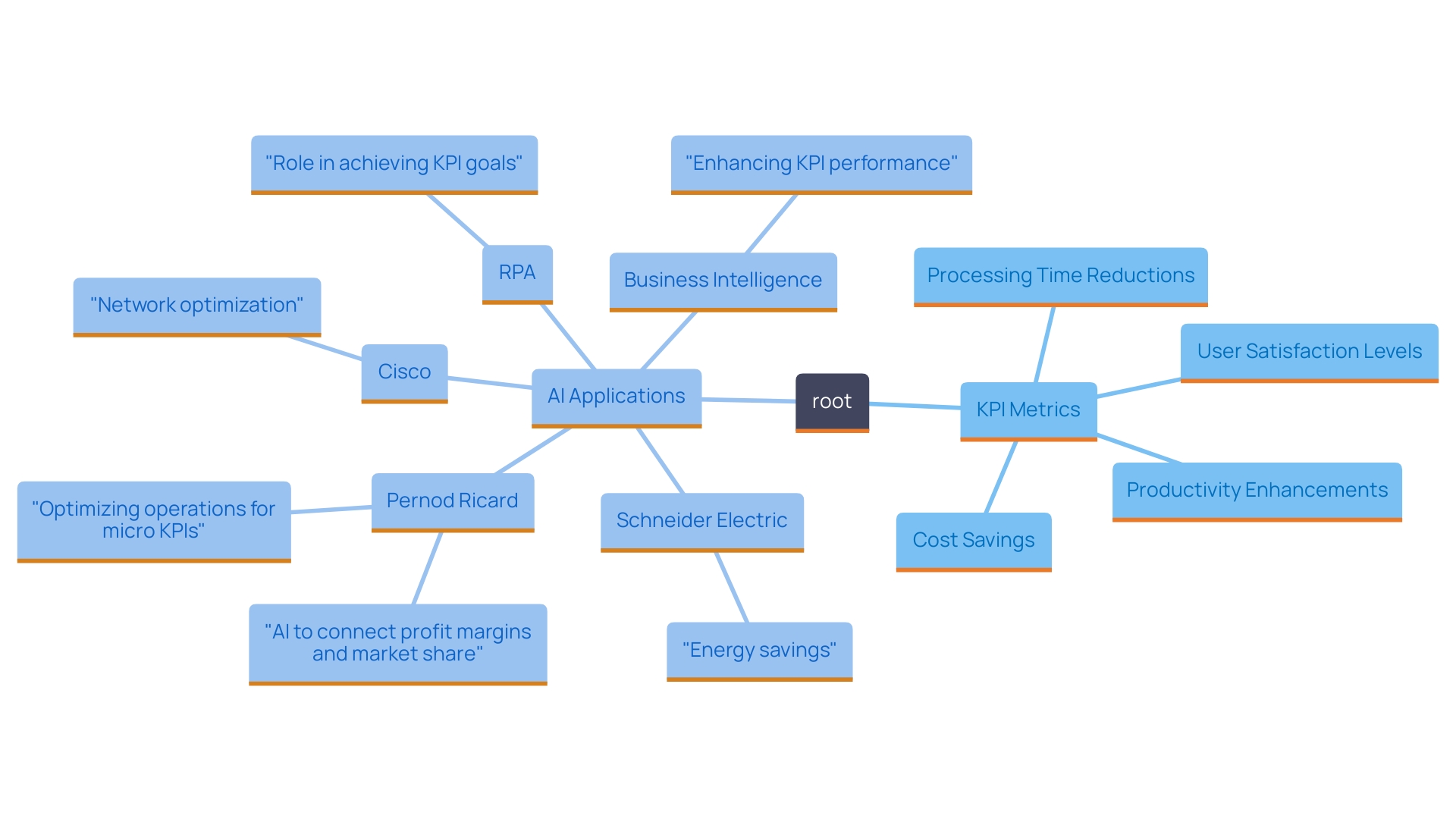Introduction
In the rapidly evolving landscape of artificial intelligence, organizations are presented with both immense opportunities and significant challenges. The role of an AI Implementation Consultant has emerged as a crucial asset in navigating this complexity, ensuring that businesses can effectively integrate AI technologies into their operations. By focusing on customized solutions tailored to specific organizational needs, these consultants empower companies to enhance operational efficiency, reduce errors, and drive innovation.
Through real-world examples and case studies, the impact of AI and robotic process automation becomes clear, demonstrating how strategic implementation can lead to measurable improvements and a competitive edge. As businesses strive to harness the power of AI, understanding the vital responsibilities, skills, and success metrics associated with this role is essential for achieving sustainable growth and transformation.
Defining the Role of an AI Implementation Consultant
An AI Implementation Consultant, illustrated by our newest addition, Hayley, who is a pretrained AI-based junior consultant, acts as a crucial figure in aiding entities with the incorporation of artificial intelligence technologies into their current processes. For instance, Hayley has previously worked with a retail company to streamline their inventory management through AI-driven analytics, resulting in a 30% reduction in excess stock. She provides tailored consulting insights, helping businesses navigate their specific needs and challenges. This role encompasses designing customized AI solutions and ensuring seamless implementation.
Our GenAI workshops enable organizations through practical training, emphasizing customized AI experiences, integration tactics, and ethical approaches that are essential for effective performance. By connecting the gap between business goals and technological capabilities, AI Implementation Consultants like Hayley play a crucial role in optimizing workflows.
A case study showing how a mid-sized company improved its performance through GUI automation illustrates the measurable results attainable through these strategies. In this situation, Hayley’s guidance was crucial in attaining a 70% decrease in data entry mistakes, demonstrating how her expertise directly aids in utilizing AI technologies for improved productivity, innovation, and competitive edge.

Key Responsibilities and Skills of an AI Implementation Consultant
AI Implementation Consultants play a crucial role in assessing organizational needs, designing tailored AI strategies, implementing robotic process automation (RPA), and training staff on new technologies to overcome workplace challenges. For instance, in a recent case, a manufacturing company successfully utilized RPA to automate their inventory management, resulting in a 30% reduction in processing time and a significant decrease in human error.
By utilizing RPA, these consultants assist entities in tackling repetitive tasks and dealing with staffing shortages, ultimately improving efficiency in a swiftly changing AI environment. Key skills for these consultants include:
- A strong understanding of data analytics
- Project management
- The ability to communicate complex technical concepts in an accessible manner
- Problem-solving skills to tackle challenges that arise during implementation
Effective consultants excel at fostering collaboration among stakeholders, ensuring that AI initiatives align with broader business goals. Their role encompasses not just technological solutions but also emphasizes change management and employee engagement to facilitate smooth transitions into AI-enhanced workflows, thereby driving data-driven insights and supporting business growth.

The Importance of Customization in AI Solutions
Customization in AI solutions is essential for addressing the specific operational challenges faced by various entities. Each business has unique workflows, data structures, and performance metrics that require tailored approaches to maximize the effectiveness of AI technologies. An AI Implementation Consultant conducts thorough assessments to understand these unique needs, ensuring that the AI solutions implemented are aligned with the company’s goals. This tailored approach not only increases the likelihood of successful implementation but also enhances user acceptance and adoption among employees, ultimately leading to better results and ROI.
For instance, a manufacturing company that implemented EMMA RPA was able to reduce its order processing time by 30%, allowing employees to focus on more strategic tasks. Similarly, a financial institution using Microsoft Power Automate streamlined its reporting process, resulting in a 40% decrease in errors and improved compliance.
Furthermore, utilizing Robotic Process Automation (RPA) solutions such as EMMA RPA and Microsoft Power Automate can further improve productivity and employee morale by automating repetitive tasks and streamlining workflows. In a rapidly evolving AI landscape, this customization is crucial in navigating overwhelming options and achieving actionable insights through Business Intelligence. Ultimately, adopting customized AI and RPA solutions not only enhances productivity but also promotes a culture of innovation and flexibility within companies.

Measuring Success: Metrics for AI Implementation
To effectively measure the success of AI implementations, organizations must establish precise metrics tailored to their unique goals. Key performance indicators (KPIs) should include:
- Enhancements in functional productivity
- Reductions in processing times
- Cost savings
- User satisfaction levels
For example, Schneider Electric’s AI solution for Waterforce has demonstrated the ability to save up to 50% in energy expenses, highlighting how AI can directly influence performance and cost savings. Similarly, Cisco’s innovative use of machine learning in networking demonstrates how AI can autonomously manage traffic and respond to security threats, significantly optimizing network performance.
Moreover, leveraging Robotic Process Automation (RPA) enhances operational efficiency by automating manual workflows, allowing your team to focus on more strategic, value-adding work. This technology not only boosts productivity but also reduces errors, addressing challenges posed by staffing shortages and outdated systems. The significance of Business Intelligence in this context is crucial, as it converts raw data into actionable insights, enabling entities to make informed decisions that drive growth and innovation.
The WildTrack Footprint Identification Technique (FIT), developed with SAS, exemplifies AI’s capability to enhance data processing in wildlife conservation, enabling effective monitoring and identification of endangered species. These examples underscore the necessity of setting clear benchmarks and continuously monitoring KPIs to evaluate the success of AI projects.
Eva Dong, a Senior Expert Manager at McKinsey & Company, emphasizes the significance of gaining insights into best practices and strategies for measuring success and ROI in AI marketing projects. Her viewpoint emphasizes the necessity for a structured method to define and evaluate metrics, ensuring that entities can effectively gauge the impact of their AI initiatives.
By collaborating with an AI Implementation Consultant, organizations can define these critical metrics and establish benchmarks for success. Continuous monitoring of these indicators allows for timely adjustments, ensuring that AI initiatives, along with RPA and Business Intelligence, drive real value and contribute to sustained business growth.

Conclusion
The integration of artificial intelligence into business operations is not just a strategic move; it’s a transformative journey that requires expert guidance. AI Implementation Consultants serve as the linchpins in this process, offering customized solutions that cater to the unique challenges of each organization. By leveraging their expertise in assessing needs, designing tailored strategies, and implementing robotic process automation, these consultants help businesses streamline workflows, reduce errors, and ultimately enhance operational efficiency.
Customization emerges as a key theme throughout the implementation process, allowing organizations to align AI solutions with their specific goals and performance metrics. The successful case studies highlighted in the article illustrate the tangible benefits of such tailored approaches, from significant reductions in processing times to improved compliance and user satisfaction. This adaptability not only fosters a culture of innovation but also ensures that employees are engaged and receptive to new technologies.
Measuring success through clear metrics is essential for sustaining AI initiatives. By establishing key performance indicators that reflect operational improvements and cost savings, organizations can continuously monitor progress and make informed decisions. Collaborating with an AI Implementation Consultant allows businesses to define these metrics and adjust strategies as needed, ensuring that the integration of AI technologies drives real value and supports long-term growth.
As organizations navigate the complexities of AI adoption, the role of the AI Implementation Consultant is invaluable. By focusing on customization, effective training, and ongoing evaluation, these experts empower businesses to harness the full potential of AI, turning challenges into opportunities for innovation and competitive advantage. Embracing this partnership is a crucial step towards achieving sustainable growth in an increasingly AI-driven landscape.

